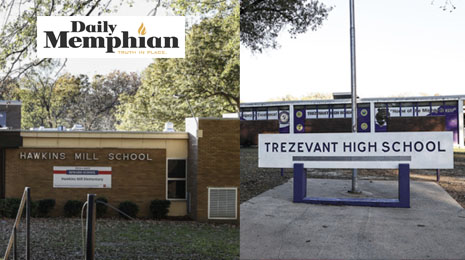
Originally published in Daily Memphian, November 24, 2024
A new Tennessee project to improve academic performance at struggling schools is paying off, according to the Memphis participants in two Frayser schools.
Last year, both Hawkins Mill Elementary and Trezevant High shed the so-called priority school designation they had each carried for more than a decade, a marker that identified them among the bottom 5% of schools in the state.
Officials trumpeted the improvements to the Tennessee State Board of Education on Thursday, Nov. 21, as evidence that school turnaround could be successful. At Hawkins Mill, chronic absenteeism plummeted. And at Trezevant, graduation rates climbed closer to the district average.
Both schools joined a new pilot project that Tennessee state lawmakers enacted in 2021. An initial cohort of five Tennessee schools paired with organizations that had successful track records of boosting outcomes at underperforming schools.
“They didn’t just come in and look at one part of the school,” said Robin Copp, assistant commissioner of school turnaround for the Tennessee Department of Education. In addition to evaluating academic achievement and growth, the experts looked at school culture, finances, curriculum, teaching styles and school governance.
Trust a key to success, participants say
Cognia, a global school accreditation agency based in Georgia, led the work in Memphis, working with a committee of district and school leaders, as well as parents and teachers. Cognia’s Connie Smith, who is also a former school accountability official at the Tennessee education department, emphasized that trusting relationships were necessary for each school’s improvements.
“Culture is everything, and what we have to remember is that we are outsiders,” Smiths said of her role. “…So the people within the school, the teachers, the principal, the instructional leadership team, those are the people who make this happen.”
So far, early reception at the schools stand in contrast to Tennessee’s AchievementSchool District, a state takeover initiative in its waning years that yielded mostly unsuccessful turnaround results. Critics have said the ASD, which paired chronically underperforming schools to charter operators, lacked collaboration with the neighborhood and the local school district, Memphis-Shelby County Schools. Its school portfolio in Memphis and Nashville included a concentration of schools in Frayser.
“(The) ASD didn’t work, because they haven’t involved the community, parents, and our school system. This is what works,” said Stephanie Love, a member of the local turnaround committee who has represented Frayser residents on the Memphis-Shelby County Schools board for a decade.
At just two schools in Memphis, and an initial five in all, the new pilot group is smaller than the ASD, which took on more than 30 schools for 10-year periods. Under the new pilot project, the local school committees met monthly to adjust their plans, and state representatives observed progress each month.
Another requirement of the turnaround pilot, Copp said, is that the vendors — Cognia and, at schools in other cities, Ed Direction — are paid more if their schools leave the state’s priority list.
A final evaluation of the program, which will compare the pilot schools to other priority schools, is due to the state legislature in fall 2025.
Next up: Sustaining school gains
Sustaining the academic gains and continuing to improve will be the next challenges for Hawkins Mill Elementary and Trezevant High, both set to exit the pilot program when it wraps up at the end of the current school year.
Principals at both schools tried new ways to encourage student attendance and reduce chronic absenteeism, first steps toward academic gains.
Claude Wilson, the principal at Hawkins Mill Elementary, offered attendance incentives for students, but also hosted raffles for parents. One of the prizes? Gas gift cards.
“We can see the increase of traffic in the actual school,” Wilson said, “and having no barriers and no excuses of why we can’t get students in the building.”
The school’s chronic absenteeism rate reduced to 7%, well below averages for the state and for MSCS. At the same time, academic achievement rose: A quarter of students are proficient in English and in math, compared to just a tenth two years ago. The former priority school became a reward school.
“So now you have parents in the community that know what it feels like to win,” Wilson said.
Chronic absenteeism fell, too, at Trezevant High. At 30%, the figure is roughly in line with the MSCS district average. Steady gains in English language arts pro